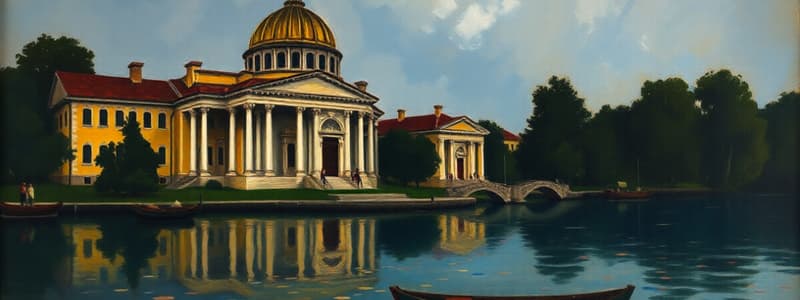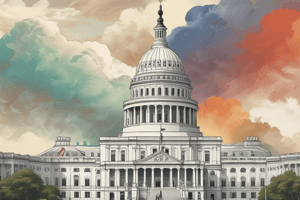Podcast
Questions and Answers
Which type of government is characterized by the absence of any rulers or enforced laws, allowing individuals to act as they please?
Which type of government is characterized by the absence of any rulers or enforced laws, allowing individuals to act as they please?
- Anarchy (correct)
- Theocracy
- Democracy
- Monarchy
In a democracy, which entity holds the supreme power?
In a democracy, which entity holds the supreme power?
- A council of elders
- The majority of the people (correct)
- A single elected official
- The military
How is power typically transferred in a monarchy?
How is power typically transferred in a monarchy?
- Through election by the people
- Through royal birth and inheritance (correct)
- Through appointment by religious leaders
- Through a council of nobles
What is the primary basis for decisions in a theocracy?
What is the primary basis for decisions in a theocracy?
Which of the following is a key characteristic of a dictatorship?
Which of the following is a key characteristic of a dictatorship?
In a republic, how do citizens exercise their power?
In a republic, how do citizens exercise their power?
What is a defining characteristic of an oligarchy?
What is a defining characteristic of an oligarchy?
In what way does a government guide a country?
In what way does a government guide a country?
Which action exemplifies a government's role in safeguarding citizens' rights?
Which action exemplifies a government's role in safeguarding citizens' rights?
If a country's economy is primarily controlled and directed by the government, which function is it performing?
If a country's economy is primarily controlled and directed by the government, which function is it performing?
Within a democratic structure, if a segment of the population feels unheard, or unrepresented, what might be a potential critique of the democratic process?
Within a democratic structure, if a segment of the population feels unheard, or unrepresented, what might be a potential critique of the democratic process?
If various religious factions within a nation vie for control over legislative decisions, and each believes their religious laws must be integrated into secular laws, which type of government structure might emerge from this conflict?
If various religious factions within a nation vie for control over legislative decisions, and each believes their religious laws must be integrated into secular laws, which type of government structure might emerge from this conflict?
In an oligarchy, if rulers prioritize the interests of their own class over the welfare of the broader population which issue is most likely to arise?
In an oligarchy, if rulers prioritize the interests of their own class over the welfare of the broader population which issue is most likely to arise?
If a dictator represses any form of dissent and imposes severe restrictions on personal freedoms while also centralizing all state power, which aspect of governance is most clearly compromised?
If a dictator represses any form of dissent and imposes severe restrictions on personal freedoms while also centralizing all state power, which aspect of governance is most clearly compromised?
If a hereditary monarch implements modern reforms by seeking advice from elected officials while preserving a tradition of royal succession what kind of government is operating?
If a hereditary monarch implements modern reforms by seeking advice from elected officials while preserving a tradition of royal succession what kind of government is operating?
In a newly formed nation aiming to establish either a direct democracy or a republic, which choice exemplifies citizen empowerment?
In a newly formed nation aiming to establish either a direct democracy or a republic, which choice exemplifies citizen empowerment?
Why might the presence of an independent judiciary be important for maintaining a balanced form of governance?
Why might the presence of an independent judiciary be important for maintaining a balanced form of governance?
Which issue would predominantly challenge a system of government that integrates religious law into the foundation of its legal system?
Which issue would predominantly challenge a system of government that integrates religious law into the foundation of its legal system?
If an absolute ruler seeks economic gains by exploiting natural resources without any regard for their environmental damage or public health risks, which ethical consideration is being sidelined by such practice?
If an absolute ruler seeks economic gains by exploiting natural resources without any regard for their environmental damage or public health risks, which ethical consideration is being sidelined by such practice?
If a nation’s government prioritizes a rapid increase in industrial production and military power, potentially overlooking issues such as income inequality and labor rights, which philosophical viewpoint would criticize such approach?
If a nation’s government prioritizes a rapid increase in industrial production and military power, potentially overlooking issues such as income inequality and labor rights, which philosophical viewpoint would criticize such approach?
Flashcards
Government
Government
An important institution that guides a country towards development, plans economic programs, and makes laws to protect citizens' rights.
Anarchy
Anarchy
The absence of government, characterized by no formal rulers or laws, where individuals act according to their own will.
Democracy
Democracy
Government where supreme power is exercised by the majority through participation in the electoral process.
Monarchy
Monarchy
Signup and view all the flashcards
Theocracy
Theocracy
Signup and view all the flashcards
Dictatorship
Dictatorship
Signup and view all the flashcards
Republic
Republic
Signup and view all the flashcards
Oligarchy
Oligarchy
Signup and view all the flashcards
Study Notes
- Government is an important institution
- Guides the country towards development
- Plans and implements programs for economic growth
- Makes laws to protect citizens' rights
Kinds of Government
- Anarchy
- Democracy
- Monarchy
- Theocracy
- Dictatorship
- Republic
- Oligarchy
Anarchy
- This is the absence of government
- There are no rulers or rules
- Everyone is free to do whatever they want
Democracy
- The supreme power is exercised by the majority of the people
- Power is given through participating in the electoral process
Monarchy
- Power is held by a particular person, usually through royal birth
- Rulers pass their power to their children
Theocracy
- All decisions are based on religion
- Led by a religious figure
- The system is based on religious laws and ideas
Dictatorship
- Ruled by one person
- One person makes all the rules and decisions and has full power
- Generally oppressive and uses force to accomplish its goals
Republic
- Authority is based on citizen voters
- Citizens elect representatives to exercise power
Oligarchy
- Rule by a small group of people
- Wealth and race have played a part in determining who is in power
Studying That Suits You
Use AI to generate personalized quizzes and flashcards to suit your learning preferences.




